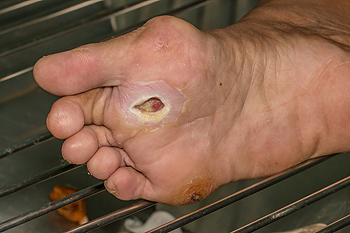The Importance of Caring for Foot Wounds
Monday, 30 December 2019 00:00 It is extremely important to seek immediate care once you notice you have a wound on your foot, especially if you are diabetic. If left untreated, and not healed properly, it is likely for a foot wound to turn into a foot ulcer. When this occurs, there is a chance that the ulcer may get infected, and in severe cases, this may lead to the need for amputation. Wounds may consist of any breaks in the skin, including cuts, blisters, cracked skin, ingrown toenails, and loss of skin due to a corn or callus. You may experience swelling, redness, pain, the appearance of pus, and the feeling of warmth on the skin as a result of having a wound. As mentioned above, those with diabetes must be diligent with checking on the health of their feet, as they tend to have less feeling in the foot region due to common circulation complications. If this is experienced, it’s possible a wound may form and go unnoticed if not directly felt. Wearing shoes that leave ample room for your toes, as well as avoiding walking around barefoot can help in preventing the formation of wounds. If you have a wound and would like to discuss your treatment options, we suggest you consult with a podiatrist for professional care and guidance.
It is extremely important to seek immediate care once you notice you have a wound on your foot, especially if you are diabetic. If left untreated, and not healed properly, it is likely for a foot wound to turn into a foot ulcer. When this occurs, there is a chance that the ulcer may get infected, and in severe cases, this may lead to the need for amputation. Wounds may consist of any breaks in the skin, including cuts, blisters, cracked skin, ingrown toenails, and loss of skin due to a corn or callus. You may experience swelling, redness, pain, the appearance of pus, and the feeling of warmth on the skin as a result of having a wound. As mentioned above, those with diabetes must be diligent with checking on the health of their feet, as they tend to have less feeling in the foot region due to common circulation complications. If this is experienced, it’s possible a wound may form and go unnoticed if not directly felt. Wearing shoes that leave ample room for your toes, as well as avoiding walking around barefoot can help in preventing the formation of wounds. If you have a wound and would like to discuss your treatment options, we suggest you consult with a podiatrist for professional care and guidance.
Wound care is an important part in dealing with diabetes. If you have diabetes and a foot wound or would like more information about wound care for diabetics, consult with Dr. Steven Schwartz from Pennsylvania. Our doctor will assess your condition and provide you with quality foot and ankle treatment.
What Is Wound Care?
Wound care is the practice of taking proper care of a wound. This can range from the smallest to the largest of wounds. While everyone can benefit from proper wound care, it is much more important for diabetics. Diabetics often suffer from poor blood circulation which causes wounds to heal much slower than they would in a non-diabetic.
What Is the Importance of Wound Care?
While it may not seem apparent with small ulcers on the foot, for diabetics, any size ulcer can become infected. Diabetics often also suffer from neuropathy, or nerve loss. This means they might not even feel when they have an ulcer on their foot. If the wound becomes severely infected, amputation may be necessary. Therefore, it is of the upmost importance to properly care for any and all foot wounds.
How to Care for Wounds
The best way to care for foot wounds is to prevent them. For diabetics, this means daily inspections of the feet for any signs of abnormalities or ulcers. It is also recommended to see a podiatrist several times a year for a foot inspection. If you do have an ulcer, run the wound under water to clear dirt from the wound; then apply antibiotic ointment to the wound and cover with a bandage. Bandages should be changed daily and keeping pressure off the wound is smart. It is advised to see a podiatrist, who can keep an eye on it.
If you have any questions, please feel free to contact our offices located in Chambersburg, and Mcconnellsburg, PA . We offer the newest diagnostic and treatment technologies for all your foot care needs.

